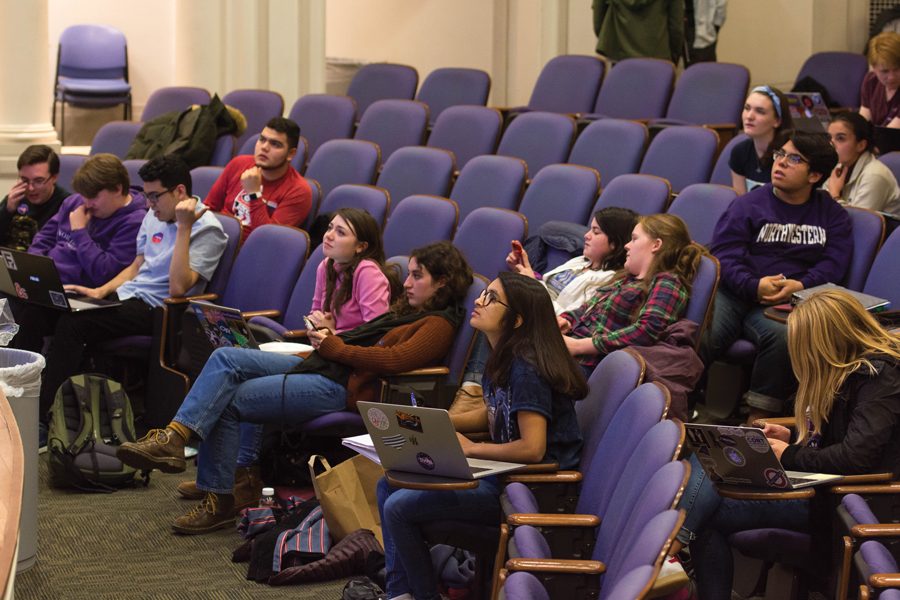For some Democratic students, the elections delivered as promised. Others hoped for more
Brian Meng/Daily Senior Staffer
Students react to election results at a Harris Hall watch party. On campus, enthusiasm for politics and the impending midterm elections seemed infectious.
November 7, 2018
On both sides of the aisle, the 2018 midterms elections were an opportunity to grab control of government. But while both parties — and some liberal Northwestern students — hoped for better, the nation will enter into yet another era of a divided Congress.
On campus, enthusiasm for politics and the impending midterm elections seemed infectious. Though some students chose not to vote or didn’t register in time, groups like NU Votes were incredibly vocal about the importance of this midterm election.
This year’s midterm election was especially tense, as it was the first major election since President Donald Trump has been in office. Some NU voters viewed their vote for U.S. representatives, senators, or governors as either a backing or an indictment of President Donald Trump.
“For Democrats, it’s essentially a referendum against Trump and his policies. Their unifying force is an anti-Trump force,” Weinberg senior James Skala said at a watch party co-hosted by NU Votes, College Democrats and Political Union.
Although individual districts and states may have ended in upsets — like Democrat Kendra Horn’s win in Oklahoma’s 5th district or Republican Mike Braun’s Senate win in Indiana — results largely aligned with what pre-election polls were suggesting.
The numbers eventually suggested Democrats would win the House, but the first few hours of polling data were underwhelming for Democrats, at one point favoring that Republicans would hold both chambers. For some students at the watch party, this seemed like deja vu from 2016.
“I was feeling pretty good during the day and got increasingly more nervous when results first started coming in,” said Weinberg senior Dorothy Hogg.
Initial Republican victories dampened zeal from those in the room who were hoping that Democrats could win more than expected. From that point on, those students just hoped that Democrats would win the House.
“I think tonight will perhaps be a blue ripple, not a wave, but I’m a cynic by nature,” said Weinberg junior Romie Drori, who is the Northwestern College Democrats’ programming director and leader of the left for Political Union. “This is a very consequential election and a lot has been made to that point.”
Drori also expressed hopes that Democrats such as Stacey Abrams in Georgia, Bill Nelson and Andrew Gillum in Florida, and Heidi Heitkamp in North Dakota would win elections — though their candidacies either ended in defeat or were too close to call. Political analysts interpreted results like these and many others as a rejection of moderate politicians.
The election was also characterized by a record number of women running for office, which some students said motivated them to vote.
“Electing females is very important because representation in all facets of government is and we want the government to as accurately as possible represent its constituents,” said Weinberg freshman and St. Louis native Campbell Schafer, who interned for Claire McCaskill’s race for senator of Missouri. “Over history, women have not been in the room for a lot of these decisions.”
The majority of U.S. Senate seats up for grabs were held by Democratic incumbents. With less seats to lose, Republicans were confident they would retain control of the Senate. As results came in Tuesday, it was clear the Democrats would lose some, including U.S. Sen. Claire McCaskill’s in Missouri.
“I’m not very surprised that the Senate remained in the hands of the Republicans because the Democrats just faced a very tough Senate map,” said Weinberg senior Broderick Topil of Kansas.
Topil faced issues voting in Kansas because of new voter I.D. laws enacted by former Secretary of State Kris Kobach that complicated “motor voter” applications. Instead, Topil voted in Evanston.
“I’m very happy with the results from Kansas. The fact that (Democrat) Laura Kelly knocked off Kris Kobach is the coolest thing to me being from Kansas.”
Wilson Chapman contributed reporting.
Email: [email protected]
Twitter: @bonijos_iahfant


